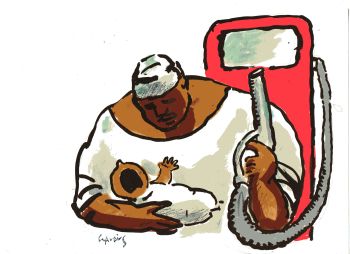CLIMATE CHANGE: Biofuels Are Not the Solution

Science tells us that we are heading for a climate crisis, yet it is within our means to change course.
However, some very worrying false solutions are on the table in the United Nations Framework Convention on Climate Change (UNFCCC) talks, for instance, promoting the biofuels currently on the market, such as ethanol.
The term 'biofuels' is misleading. These plant-based fuels are better described as 'agrofuels', for they are far from green.
Those who still argue that agrofuels emit much less greenhouse gases than fossil fuels mostly ignore the fact that emissions are released during production, as a result of land-use change, fertiliser application and processing.
Still, many governments, international financial institutions such as the World Bank, and multinational agribusiness, oil and transport companies are promoting agrofuels as a solution to world energy needs.
Shifting from fossil fuels to agrofuels is not increasing the poor's access to energy but aggravating existing problems such as land grabs, and creating particular challenges to food supplies due to a shift from food cropping to fuel cropping.
Crucially, agrofuels can divert resources from clean, renewable energies like wind and solar.
Large-scale cultivation of agrofuels, unlike small-scale, locally produced and owned agrofuel activities, is usually accompanied by problematic activities such as intensive use of water, chemicals, fertilisers and pesticides.
These often result in polluting, depleting and degrading available water resources, which can trigger famines.
Analysts have shown that there is not enough agricultural land on earth to grow agrofuel crops to meet the huge energy needs driven by our current and unsustainable ways of living.
It is worthy to note that a recent 2011 report on the Global Hunger Index points to climate change, growing demand for biofuels, and increasing commodities futures trading in global food markets as the causes of price increases in food, which it says were also exacerbating the unfolding food crisis in the Horn of Africa.
Agrofuels are simply not a solution to the climate and energy crisis, although there is evidence that small-scale, locally produced and owned biofuels can be part of the solution when they help meet local needs.
In my country, Nigeria, the Nigerian National Petroleum Corporation (NNPC) and its foreign partners acquired large chunks of land, in almost all the 36 states of the country, for the production of ethanol, from staples like cassava, sorghum and sugarcane. Some of the agrofuel plantations and production plants are located in communities with pre-existing water shortages, which leave the communities with almost nothing to live on.
Researchers from Friends of the Earth Nigeria found during one field visit that local people had not even been consulted by the state government before community lands were appropriated.
Africa looms large on the radar of agrofuels promoters and African governments see in them potentially huge financial benefits for the political and financial elites of the country.
But a substantial and increasing amount of scientific research shows that agrofuels are fuelling deforestation, biodiversity loss, soil degradation, water pollution and depletion, and even climate change.
Decision makers must acknowledge that, and the fact that agrofuels have also been proven to fuel food price increases, hunger, land rights violations, conflicts, displacement and human rights abuses.
The fact that agrofuels have triggered a new scramble for Africa is no longer news. Millions of hectares are being grabbed with little concern for the poor who are bound to face displacement and for the impact that this will have on family farms and other small-scale farms and food production on the continent.
Agriculture contributes to more than a fourth of the world's greenhouse gas emissions. Unfortunately, the UNFCCC texts do not make it clear that the main culprit is industrial agriculture with its dependence on chemical fertilisers and damaging monocultures, including agrofuel crops.
Small-scale farmers, on the other hand, mostly use agro-ecological practices which cool the planet instead of warming it.
Many governments, lobbied by companies, are pushing the U.N. climate negotiations to support false solutions to the climate crisis, for instance shifting to agrofuels and trading carbon emissions instead of cutting them.
As a consequence, our planet is heading for an average global temperature increase higher than two degrees, and the catastrophic consequences that science tells us will come with it.
Addressing the climate crisis requires binding targets for emissions reductions, targets enforced without so-called carbon offsetting, which is just a smokescreen to hide pollution-as-usual.
Voluntary emissions reduction targets such as those included in the Copenhagen Accord and the Cancun agreement are simply ineffective.
We have to stop all false solutions, including large-scale agrofuels. We should instead urgently invest in the real solutions, such as reducing consumption, improving energy efficiency, switching to clean renewable energy and to sustainable local food production.
While the official U.N. negotiations on climate change continue to progress at a snail's pace, the World Peoples Conference on Climate Change and the Rights of Mother Earth held in Cochabamba, Bolivia in April 2010 made some headway and issued a People’s Agreement describing and demanding real solutions to the climate crisis.
* Nnimmo Bassey is the current chair of Friends of the Earth International and executive director and founding member of Environmental Rights Action. This story was originally published by Latin American newspapers that are part of the Tierramérica network. Tierramérica is a specialised news service produced by IPS with the backing of the United Nations Development Programme, United Nations Environment Programme and the World Bank.
© Inter Press Service (2011) — All Rights ReservedOriginal source: Inter Press Service
 Global Issues
Global Issues